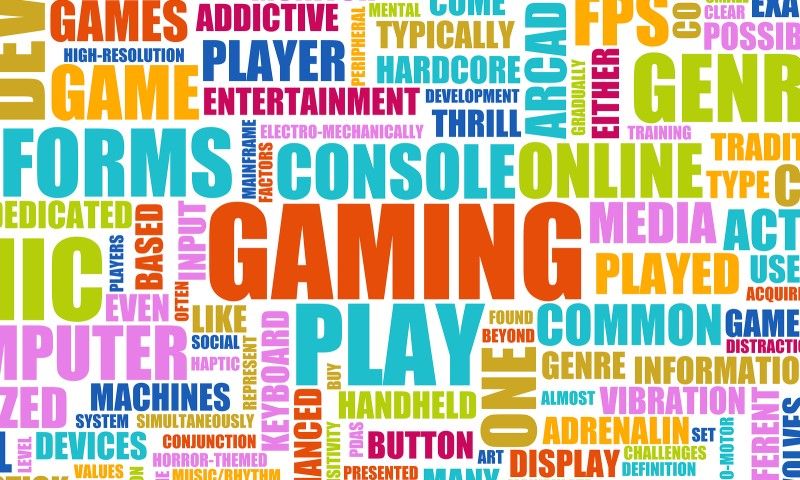New players often struggle to understand what’s going on when they try to play online or even to simply discuss their passions or complaints with others on forums. This becomes even more complicated when new gaming terminology keeps springing up, especially in a relatively new space like Twitch where the culture is still developing and evolving. So, for both for new players and those who are just trying keep up, here’s a list of the most common terms that you’re likely to quickly encounter on your Twitch adventures:
- AFK (Away From Keyboard) – When a player is away from their computer. Generally used to refer to a sudden unresponsiveness from a specific player.
- AMA – Ask Me Anything.
- Bots – Automated opponents within a game.
- BR – Battle Royale.
- Brb – Be Right Back.
- Campers – Players with strong stats or skills who remain stationary at tactical spots in order to defeat weaker players that might come past. This is a common tactic in PvP games.
- DCCG – Digital Collectable Card Game.
- Deck Recipe – these are lists of cards to build a strong deck in a card game. They usually exist in the games meta and are created by other gamers and posted online to assist others who may not be skilled at deckbuilding but have decent cards. This term is usually used in HearthStone, while MTG Arena calls them ‘decklists’.
- DLC – DownLoadable Content.
- Feeding – Deliberately allowing one’s character to be killed repeatedly thereby helping the opposing team.
- Free to Play (F2P) – These are games that players can be played free of charge.
- Freemium – these are games where the base content is free, but certain aspects of it are not. This can include certain levels, quests, cosmetic items, boost-packs, loot-packs, limited access to levels, removal of advertisements, among others.
- Farming: The acquisition of items in a game. This usually occurs through an action carried out by a player’s character. In World of Warcraft, for instance, a player will need to acquire pickaxe and mine rocks to gather certain crafting materials.
- FFA – Free-for-all.
- First-Person Shooter (FPS) – These are shooter games that offer a perspective limited to the hands and or weapons of a character.
- Ganking – the action of a group of players ganging up on another, usually weaker player. This is generally done for the purposes of PKing and is frowned upon by the gaming community.
- GOAT – Greatest Of All Time.
- Grinding – Slowly gaining experience or resources in a game to either gain access to more difficult levels or quests, or potential for advancement. Grinding varies cased on the genre. For instance, in F2P card games, this often involves playing daily quests to earn packs that might enable players to build a better deck.
- HP (Health Power/Hit Points) – this is the amount of ‘life’ that a character has during the game. Generally, a character’s HP being reduced to zero will result in the player’s character dying.
- IGL – In-Game Leader.
- IGN – In-Game Name
- IRL (In-Real-Life): Usually refers to a streaming -style where streamers will broadcast aspects of their day-to-day lives to their viewers. This can include chatting about various aspects of a topic, performing a stunt or creative task, going shopping or adventuring, among others re-world undertakings.
- Jebaite – This either refers to playing a prank or having a debate.
- Kappa – this is a Twich-specific emote that indicates sarcasm.
- LARP – Live-Action Role Play
- Leaderboard – players that are top performers on a server or region in an online game. These positions are usually held by streamers, especially in BR games.
- Magic/Mana Power (MP) – this refers to the amount of points that a character has to perform special spells or actions during a game.
- Mana – Resource used to cast spells in RPG games. in card games, this is a payment system for playing cards. Mana usually builds up over rounds so that stronger spells or cards can be played as the game progresses.
- Massive Multiplayer Online Game (MMO) – these are open-world games that allow thousands and sometimes even hundreds of thousands of players to create avatars that can engage and interact with one another on a single server.
- MMORPG (Massive Multiplayer Online Role-Playing Game) – see ‘MMO’ and ‘RPG.’
- Metagaming – in RPGs, this refers to the player’s applying their real-world knowledge to the decision that that character makes, meaning that they use information that their character would not realistically know about to assist their character in their decisions. Online RPGers disapprove of this, as they feel that it detracts from the purpose of the game.
– in board and card games, this refers to information that exists outside of the games main rules. For instance, in both MTG Arena and HearthStone there are deck recipes designed by pros that gamers who are into the meta will access in order to help them defeat other deck types, rather than attempting to build their own decks. - MMR – MatchMaking Ranking/Rating.
- Mod:
(a) moderator. They are responsible for maintaining forums and ensuring that users stick to the rules. They are also responsible for enforcing the penalties on rule-breakers.
(b) a game modification. These are usually generated by community members and are F2P. These can include maps or min-games, as with Dota 2: Auto Chess. - Mulligan – a re-take in a game. This can be undoing a move in a strategy game or reshuffling and redrawing a hand in a card game.
- Multiplayer Online Battle Arena (MOBA) – Players choose from a variety of characters or heroes, each with their own array of abilities and skills. This game-style usually involves teams of between 1 to 5 players against a team of the same number. Players will then try to defeat the opposing teams base. This will entail the two players battling across an in-game map with varying obstacles. As players defeat NPC monsters or opponents, they will earn in-game currency which will allow them to purchase new items or spells to boost their character in order to gain an advantage in the game until their team is eventually able to overpower the opposition and win. The opposing team can comprise of either real-players or bots, depending on the format. See LoL or Dota 2 for examples.
- Multiplayer Online Game (MO) – A type of online game that allows for a certain number of players to play together online in certain settings. This varies according to the game type. See ‘Battle Royale’ and ‘Arena’ for examples.
- Nerf – this term refers to an aspect of a game that was downgraded during an update. For instance, if developers felt that a certain weapon’s specs were too high, they might lessen one of them to make the game more balanced. Players will then say that the weapon’s specs have been ‘nerferd’.
- NES – Nintendo Entertainment System.
- NPC (Non-Player Character) – an autonomous in-game character. Usually included in the game to enhance the player’s gaming experience in some way. This could include simple irrelevant statements to providing player’s with world-building lore or new missions. Other NPCs include monsters and background characters.
- Noob – Someone who is new to gaming or to a particular game. Often used as a put-down when players make basic mistakes in a game.
- OG – Original Gangster. Can refer to main characters from the original game in a video game franchise.
- OP (Overpowered) – This refers to an element in the game that is exceptionally strong and difficult to defeat. This could be a weapon or boss in an RPG or a card that immediately ends a DCCG match.
- Open source – Coding that is shared publicly so that others can use, improve upon or adapt the coding.
- Open-World – this refers to an online world that is borderless and can be freely explored by a player’s character without any limitations, such as specific objectives or goals.
- Party – a group of players that band together to complete an in-game quest in an RPG.
- Patch – an upgrade to an existing game that will change certain elements in a game, such as bug-fixes, nerfs or adding new content. The change is minimal enough not to be considered an expansion.
- Pay-to-Play (P2P) – Players can only access this content if they pay the subscription fee or purchase the game.
- Pay-to-Win (P2W) – a gaming format where players can pay for content that will give them an advantage over other players in a game.
- Pepe – Popular internet meme character that originated in Matt Furie’s online comic, Boy’s Club.
- PK (Player-Killing) – this refers to killing other players in an MMORPG. This is usually done to earn extra experience points and/or loot the other player.
- PogChamp – the Play-Of-Game Champion emote. An emote on Twitch that denotes amazement and hype.
- Poggers – an emote on Twitch indicating excitement, shock or hype in a chat-feed. It is interchangeable with the PogChamp emote.
- POI – Point Of Interest
- Pub – Public lobby.
- Pubbing – Queuing for public match-ups.
- Pubstomper – ‘Public Stomping.’ This refers to defeating other random players in a game.
- PvC (Play-Versus-Computer) – see ‘PvE.’
- PvE (Player-versus-Environment) – players can only engage with the environment and kill NPCs.
- PvP (Player-versus-Player) – players can harm or kill each other’s characters.
- Quest – A task that is usually given to a player’s character in an RPG game by an NPC. It can advance the storyline, but always offers a reward of some kind upon completion. They are also often issued as daily log-in incentives in other games such as HearthStone or Fifa 19.
- Raid – a type of quest that requires a party and that offers large risks and rewards from a World Boss.
- RDM – Random Death Match.
- Real-Time Strategy (RTS) – this refers to a game where players control one or more units in either a PvP or PvC setting. As it is real-time, progress cannot be saved.
- Respawn – when a killed character or NPC regenerates. This occurs within a certain period of time dependent upon the type of character of NPC that is generated. Whether a character or NPC can respawn is dependent upon the game and mode. This is a feature commonly found in MOBAs and MMORPGs.
- RPG (Role-Playing Game) – these games require participants to behave within the framework of the game’s lore and their character’s specifications. This can be limited to certain minor traits such as user names, but can also include greater elements, such as speech, and mannerisms. Games with RPG requirements will usually provide users with a set of guidelines for players to adhere to.
- Rushers – These are players that attack their opponents while on the move, such as while using vehicles or running past them.
- Scrim – Practice.
- Shoutcaster – a professional commentator for eSports.
- Simulation – a game that simulates an aspect of real-life. For instance, Call of Duty simulates warfare, while the Sims franchise simulates real-life interactions.
- SMG – Sub-Machine Gun.
- Smurf – an experienced player who creates a new account on a game in order to defeat real noobs for easy wins.
- Solo-queue (SoloQ): waiting to be partnered with other teammates through automatic matchmaking on an online video game platform.
- Spam – unwanted digital messages or information, or repeated messages in a chat or email inbox.
- Spawn – this refers to the generation of characters or creatures within a game. This occurs according to a specific in-game schedule.
- Specs (Specifications) – the various attributes of a certain element in a game.
- Stealth Shooter – games where players avoid direct confrontation with the enemies by stealth, with the goal of either escaping from them completely or to sneak up on them for a surprise attack.
- !schedule – a code to paste in a streamer’s Twitch chat to view their stream schedule, if they have applied it.
- !Subs/!Subcount – sometimes shows current number of followers when typed in a streamer’s chat.
- TBH – To Be Honest
- Tenkeyless (TKL) – A compact keyboard that is missing the extra numberpad that is usually found on the right of the keyboard.
- Third-Person Shooter (TPS) – a shooter game where the perspective allows the player to see their full character. This could be limited to the rare-view of a character, or could also allow for a more panoramic perspective.
- Trading Card Game (TCG) – collectible card games such as Pokémon, Yu-Gi-Oh! and Magic: the Gathering that allow for players to trade their unwanted cards with other players. This usually only applies to the IRL paper version of the game, although there are some exceptions.
- Troll – someone who intentionally tries to bait and anger others on online forums.
- UI – User Interface
- Widget – an add-on for a UI that offers a particular function or service.
- World Boss/Boss Monster – a particularly powerful NPC adversary in a game that is the final monster to be defeated in a particular questline.
- XP (Experience) – the amount of points that a player’s character has. These points are usually earned by achieving certain in-game objectives. Earning enough XP points generally unlocks the next level of a player’s character.







